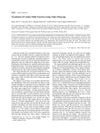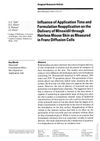 6 citations,
January 2011 in “Journal of veterinary medical science”
6 citations,
January 2011 in “Journal of veterinary medical science” Using a video otoscope effectively treated ear infections in dogs.
 5 citations,
January 2019 in “Clinical Drug Investigation”
5 citations,
January 2019 in “Clinical Drug Investigation” Some off-label treatments increase hair density, but long-term safety unknown.
 5 citations,
May 2018 in “Statistics in Medicine”
5 citations,
May 2018 in “Statistics in Medicine” Model improves accuracy in predicting hair loss effects.
 5 citations,
January 1994 in “Skin Pharmacology and Physiology”
5 citations,
January 1994 in “Skin Pharmacology and Physiology” Minoxidil absorption in skin is slowed by cleansing, depends on how long it stays on the skin, and is not much affected by reapplication.
 2 citations,
September 2016 in “Springer eBooks”
2 citations,
September 2016 in “Springer eBooks” Humans can accurately guess age from faces, with women being slightly better at it, and age perception is linked to evolutionary factors.
 1 citations,
August 2023 in “International journal of pharmacy & integrated health sciences”
1 citations,
August 2023 in “International journal of pharmacy & integrated health sciences” Cosmeceuticals are popular for their skin health benefits and anti-aging effects.
 1 citations,
July 2019 in “Microscopy Today”
1 citations,
July 2019 in “Microscopy Today” Microfluorometry effectively measures how much polymer coats and penetrates hair, useful for evaluating hair products.
 1 citations,
January 2016 in “Elsevier eBooks”
1 citations,
January 2016 in “Elsevier eBooks” The document concludes that a complete skin restoration biomaterial does not yet exist, and more clinical trials are needed to ensure these therapies are safe and effective.
 October 2024 in “Current Trends in Biotechnology and Pharmacy”
October 2024 in “Current Trends in Biotechnology and Pharmacy” The shampoo effectively promotes hair growth and is halal-compliant.
 March 2022 in “Journal of clinical case studies reviews & reports”
March 2022 in “Journal of clinical case studies reviews & reports” COVID-19 can cause different skin issues, including rashes and hair loss.
 224 citations,
March 2006 in “Seminars in Cutaneous Medicine and Surgery”
224 citations,
March 2006 in “Seminars in Cutaneous Medicine and Surgery” The document concludes that understanding hair follicle biology can lead to better hair loss treatments.
 202 citations,
June 2005 in “Aaps Pharmscitech”
202 citations,
June 2005 in “Aaps Pharmscitech” Lecithin organogels could be good for applying drugs to the skin because they are stable, safe, and can improve drug absorption.
 87 citations,
March 2000 in “American Journal of Clinical Dermatology”
87 citations,
March 2000 in “American Journal of Clinical Dermatology” Alpha-hydroxy acids, like glycolic acid, safely improve skin issues and work on all skin types.
70 citations,
January 2014 in “International review of cell and molecular biology” Keratin proteins are crucial for healthy skin, but mutations can cause skin disorders with no effective treatments yet.
 21 citations,
February 2017 in “International Journal of Women's Dermatology”
21 citations,
February 2017 in “International Journal of Women's Dermatology” Hormonal therapies help treat female hair loss, but results are slow and vary.
 20 citations,
September 1978 in “International Journal of Dermatology”
20 citations,
September 1978 in “International Journal of Dermatology” Hair growth is influenced by factors like genetics and nutrition, and more research is needed to understand hair loss and growth mechanisms.
 17 citations,
November 2017 in “Dermatologic Clinics”
17 citations,
November 2017 in “Dermatologic Clinics” New techniques improve hair restoration success.
 15 citations,
November 2020 in “Pharmaceutics”
15 citations,
November 2020 in “Pharmaceutics” Tofacitinib nanoparticles can safely and effectively treat alopecia areata by targeting hair follicles.
 15 citations,
October 2014 in “Hormone Molecular Biology and Clinical Investigation”
15 citations,
October 2014 in “Hormone Molecular Biology and Clinical Investigation” Some hair loss and prostate drugs might increase the risk of diabetes and heart disease.
 14 citations,
May 2019 in “Human gene therapy”
14 citations,
May 2019 in “Human gene therapy” MC-DNA vector-based gene therapy can temporarily treat CBS deficiency in mice.
 13 citations,
September 2012 in “Critical Reviews in Food Science and Nutrition”
13 citations,
September 2012 in “Critical Reviews in Food Science and Nutrition” Wheat straw is valuable for its health benefits and various industrial uses.
 11 citations,
August 2013 in “International Journal of Cosmetic Science”
11 citations,
August 2013 in “International Journal of Cosmetic Science” The study suggests that a new protease inhibitor can make hair harder to pull out, potentially reducing hair loss.
 10 citations,
April 2000 in “Archives of Oral Biology”
10 citations,
April 2000 in “Archives of Oral Biology” Minocycline may cause hair loss by increasing DHT levels, but finasteride can help counteract this effect.
 3 citations,
August 2011 in “InTech eBooks”
3 citations,
August 2011 in “InTech eBooks” The document concludes that skin grafts are essential for repairing tissue loss, with various types available and ongoing research into substitutes to improve outcomes and reduce donor site issues.
 2 citations,
March 2005 in “International Journal of Cosmetic Science”
2 citations,
March 2005 in “International Journal of Cosmetic Science” Human hair structure varies by ethnicity, and certain treatments can improve hair condition and appearance.
 2 citations,
March 2004 in “Reviews in Gynaecological Practice”
2 citations,
March 2004 in “Reviews in Gynaecological Practice” Hormonal changes and psychological issues can cause sexual dysfunction in postmenopausal women. Behavioral therapy is recommended first, with hormone replacement helping some symptoms but not libido. Testosterone can improve libido, but its effects on overall sexual function are unclear. Emotional and relationship issues should be addressed before using medication, and the benefits and risks of testosterone supplementation should be considered.
 1 citations,
November 2017 in “Expert opinion on orphan drugs”
1 citations,
November 2017 in “Expert opinion on orphan drugs” Scientists now better understand the genetics of hypohidrotic ectodermal dysplasia, leading to more accurate diagnoses and potential new treatments.
 1 citations,
March 2005 in “International Journal of Cosmetic Science”
1 citations,
March 2005 in “International Journal of Cosmetic Science” Twisting hair weakens it, but strength can be recovered at low twist levels.
 April 2024 in “Canadian Women s Health Today”
April 2024 in “Canadian Women s Health Today” PCOS treatment focuses on lifestyle changes and specific medications to manage symptoms and complications.
 December 2023 in “Frontiers in plant physiology”
December 2023 in “Frontiers in plant physiology” Root hairs are key for developing cereals that can fertilize themselves with nitrogen.





























